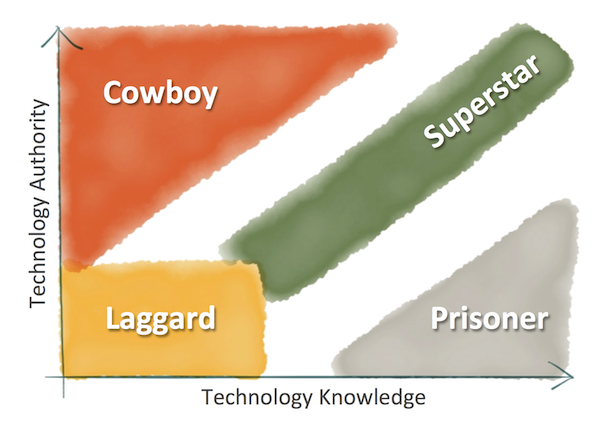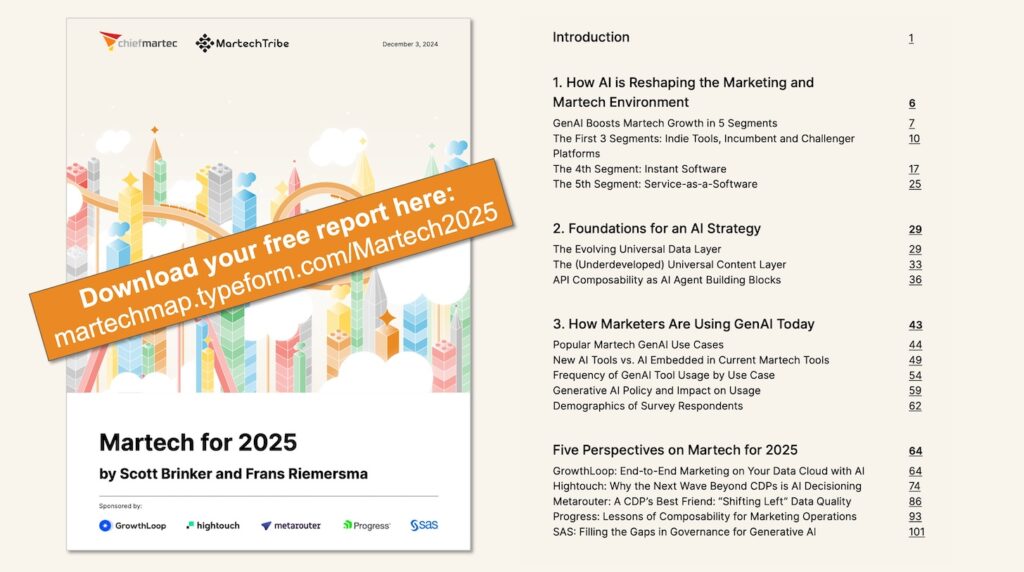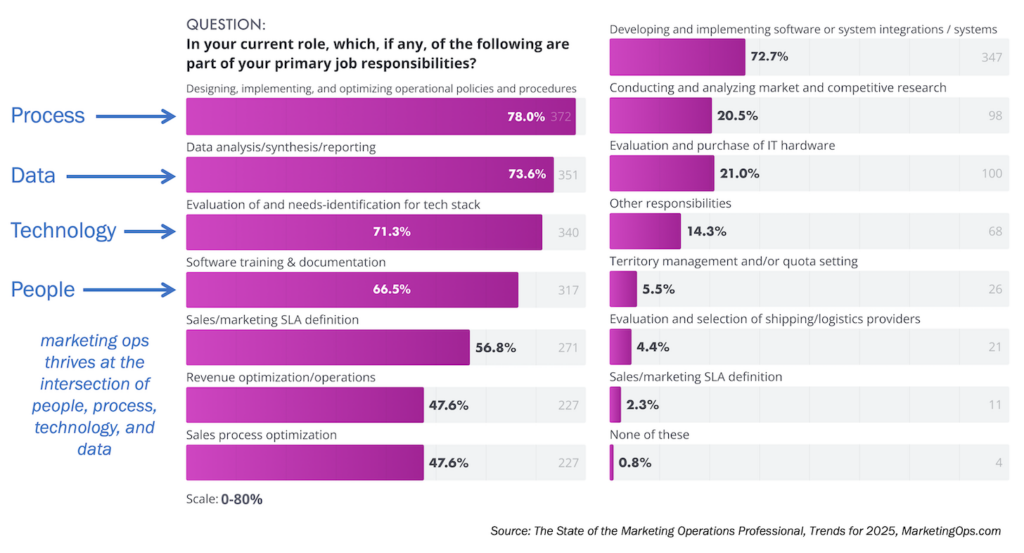
“It’s no longer a question of whether technology plays a role in marketing; it’s about what role the CMO needs to play in selecting the best solution to drive marketing and overall business success.”
So begins the latest Forrester report, The CMO’s Role In Technology Purchasing ($499), by Sheryl Pattek. She summarized the report in a terrific blog post, Savvy CMOs Must Steer Their Marketing Technology Decisions In The Right Direction (free).
So what role should CMOs play in technology leadership?
Forrester and I both agree that, at the highest level, marketing must take responsibility for guiding the technology-based capabilities it needs to engage the modern customer. A CMO may be able to survive without knowing how those technologies work — although that has risks — but there is no future for a CMO who isn’t playing a leadership role in how his or her department will use technology.
I think the question can be further framed along two dimensions, as illustrated above:
- How much technology authority should rest with marketing?
- How much technology knowledge should exist within marketing?
In my opinion, marketing should advance up the diagonal of that illustration — the green superstar sweet spot — acquiring more technology authority in proportion to developing more technology expertise.
Problems arise when the balance veers too far off in one direction or another. A marketing department with great technology authority but little internalized technology knowledge runs the risk of being a cowboy (or Calamity Jane, for gender parity). Or, if a marketing team becomes tech-savvy — particularly in digital marketing — but remains constrained by overly restrictive IT policies, they’re a prisoner to a previous era.
To not move forward at all is to be a laggard. Forrester identifies the risks to laggards as an over dependence on IT for marketing’s performance and the potential for the business as a whole to fall behind more nimble competitors.
Now, let me make two clarifications about becoming a superstar:
1. Even as marketing develops its own technology authority and knowledge, it should absolutely seek a collaborative relationship with IT. These are not mutually exclusive. To the contrary, the more technologically advanced the marketing department is, the more it has to gain in being well-coordinated with IT.
2. The CMO doesn’t need to personally be the pinnacle of the marketing department’s technology expertise. However, he or she must assemble the right team to develop technology knowledge within the marketing organization. And the more technology savviness the CMO has, the greater the odds of success are with that leadership mission.
Yippee ki-yay, we’re buying marketing automation!
Business decisions should drive technology decisions, not the other way around. But that doesn’t mean that the messy details of technology don’t have a profound impact on the possibilities — and feasibilities — of those business decisions.
Cowboy CMOs who brashly wield newfound technology budgets without appreciating the complex dynamics of technology management run the risk of hurling themselves into a China Syndrome scale disaster.
Representing the “cowboy” approach to marketing technology leadership was a guest article on ReadWriteWeb last month by CMO Esmeralda Swartz — So What If Chief Marketing Officers Outspend CIOs On Enterprise Tech? — that cavalierly claimed, “What do you really need to know?” We buy cars without knowing how they work. We buy houses without knowing how they’re built. So why do we need to know anything about technology to buy marketing software? It largely dismisses that CIO has any real expertise in technology purchasing.
Calamity Jane showed up with guns blazing.
Peter Kretzman, one of my favorite CIO bloggers, rebutted with a blistering post, So What? Here’s What. Every marketer should read his rebuttal to appreciate why purchasing marketing technology is not as simple as some of the vendors selling it to you would like you to believe.
You can fire your agency and switch to a new one in a snap. You cannot swap out your marketing technology infrastructure and switch to a new one with the same ease. Not even close.
Previously, Peter and I have disagreed about how much technology responsibility should rest within the marketing department — I continue to assert that the more tech capability the marketing department natively has in this brave new digital world, the better. But I don’t underestimate the expertise required for that capability. The issues Peter raises in his post demonstrate the kind of technology knowledge that marketing must come to appreciate to wield its growing technology authority wisely.
In my opinion, a CMO should take a multi-pronged approached to marketing technology:
- Collaborate with the CIO to leverage the company’s existing capabilities to the fullest degree, to coordinate integration with other technology initiatives in the company, and to find that right sweet spot of division of responsibilities between marketing and IT (which will vary from one organization to the next).
- Hire a marketing technology leader within the marketing department as his or her right hand — to facilitate collaboration with the IT department, advise the CMO on technology strategy, and help the rest of the marketing team take full advantage of technology-powered capabilities. Here’s a great example of how Nationwide did just that.
- Learn as much as he or she can about technology management — I emphasize management, as this is not about becoming a programmer, but being savvy about governing technology-dependent strategy and operations.
All three of these seem key to the future of the CMO role. In their report, Forrester cites the Economist Intelligence Unit’s research that found 1 in 4 CEO’s rank “technical expertise” as one of the top three qualities they look for in CMOs. (Note that agency experience was chosen by only about 1 in 10.)
CMO technical expertise should include knowing how to collaborate with the CIO and other technology stakeholders, knowing how to hire and lead technical staff, and having the confidence to manage those relationships in the pursuit of a technology-enabled marketing vision.
So what role should the CMO play in purchasing marketing technology? As great of a role as he or she is capable of — but no greater.
What do you think?



Thanks for the insightful post, Scott. Successful marketing technology adoption is all about striking the right balance. Clearly Marketing needs to be in control of its own destiny. Neither a Laggard or Prisoner modus operandi will achieve that. We need to be both technology savvy as a buyer and user, and humble enough to recognize we’ll only succeed through tight alignment with IT, where the deeper expertise lies. The Cowboy approach leaves trails of dead bodies all over town (damaged cross-functional relationships, enterprise-wide financial repercussions from poorly-optimized marketing investments).
For more on the implications of cowboy behavior by marketing leaders, check out my CMO.com article:
http://mopartners.com/7-myths-cmos-and-their-bosses-just-gotta-stop-buying-2/
The Article is definately a good one . The CMO needs to have a stronger control on the IT functions. This is more so based on the urgencty of response or framing a response to maintain and build the market size. However there is a major issue on CMOs and their overall savvyness on the IT side. What I mean by that is specifically
1. The Analytics and BI requirements.
2. Hardware and OS.
3. WAN and media connectivity /traffic issues
4. Sales force and Digital Marketing with OOH and activation coordination statuses on the fly ( what apps can and should be deployed)
A situation of CMOs not being absolutely updated on these issues would not be uncommon.
CIO and CMO need to work out a system to clearly provide a effective marketing and sales MIS separately which integrates with the overall MIS/ERP seamlessly but the Marleting and Sales Is managed and administered under the control of the CMO.
The CIO remains the custodian of the information integrity and the CEO holds both accountable for ensuring a meaningful dialogue which is role driven and not Turf driven.
Finally if the CMO wants to get top class supprt he will coopt the CIO in the discussion and use his skills to complement his own .
The CIO will have a supprtive role as the CMO has to get the sales or market share. He has the mandate to ensure it.
Great post Scott as always of course. I honestly think the balance between how much technology footprint is owned by Marketing vs IT is always going to be dependent on the Organization and how it is structured and organized BUT there is no doubt that it is absolutely collaborative and complimenting and not one or the other. The long term benefit is in merging the skills and capabilities from both orgs to lead a marketing technology capability that ignores the organizational boundaries.
I believe that the Marketing Team working for the CMO must have a command of the functional capabilities of the technology. They should have Power Users on the Marketing team. The CIO can provide the talent to handle the technology and how it is architected and integrated into the overall landscape.
Very timely post Scott. Right in line with some thoughts I had on this same topic. Marketing needs to have the freedom (and budget) to pursue new marketing technologies in a timely manner that will benefit the business, but also needs to recognize the technological dependencies that necessitate a close partnership with I.T. to fully implement and support those new technologies within the enterprise. Competencies that are specific to delivering the new technologies and benefits to the business should be within the realm of the Marketing organization, but other competencies that are outside of the normal purview of Marketing or Marketing Operations, should be provided by I.T.
Examples of competencies that should remain within Marketing are:
– Configuring the logic in the tool/service in ways that allow it to deliver the capabilities/advantage it provides
– Data Management capabilities that leverage the tool/service in a way that enhances or cleanses the data to suit Marketing’s needs
– Provide Reporting to Stakeholders that is specifically available within the tool/service
Examples of competencies that should remain in I.T. are:
– Management of Security Roles/Policy and User Provisioning
– Technical Support of users on the Platform and coordination/escalation of Support with the Vendor
– Data Modeling, Field Mapping, Data Dictionary Maintenance, especially as it relates to the integration with other systems within your Marketing/Sales/Reporting ecosystem
– Management of Data Export/Import, Data Warehouse and Reporting BI/Analytics platform necessary to provide an E2E view of your funnel (Social and Web Analytics, Web Impressions/Responses/Inquiries, Leads, Opportunities, Closed/Won Deals,etc)
– Program Management and QA coordination of new releases that affect other integrated systems
In addition, I would say that I.T. needs to have the budget, resources, and policies in place that will allow it to remain agile and supportive of Marketing’s evolving needs, so that it does not become perceived as a bottleneck to the process and leave Marketing to consider bringing more of these capabilities “in house” than it is prepared to handle.